Section 7: LITHUANIA IN THE WORLD


THE VOICE OF INTERNATIONAL LITHUANIA
|
VilNews has its own Google archive! Type a word in the above search box to find any article.
You can also follow us on Facebook. We have two different pages. Click to open and join.
|
Thu, 20th October, 2011 - Posted by - (1) Comment

The ‘Lithuanian’ senator, Richard ‘Dick’ Durbin (67) with President Barack Obama.
Durbin is the senior United States Senator from Illinois and the Senate Majority Whip, the second highest position in the Democratic Party leadership in the Senate. Durbin was born in Illinois to an Irish-American father, William Durbin, and a Lithuanian-born mother, Ann Kutkin (Lithuanian: Ona Kutkaitė). Durbin has over many years done a truly great job not only for America but also for his motherland, Lithuania!
Text: Aage Myhre, Editor-in-Chief
aage.myhre@VilNews.com
During a visit to the U.S. some years ago I spoke with immigrants from various countries who now live in the United States. All with one thing in common; that they had abandoned their homelands. I met exiled Cubans. I saw Iranians who fled to USA after their Shah, Mohammad Reza Shah Pahlavi, was overthrown from the Persian Peacock Throne in 1979. I talked to many Eastern Europeans who escaped Stalin's atrocities during and after World War II. I talked to Jews who were born in the U.S., but still feeling and having very close ties to Israel.
It strikes me that the U.S. has done much more for exiled nationalities than what our Western European nations have done.
It was probably not without reason that the majority of Eastern Europeans who managed to flee westwards towards the end of World War II preferred the U.S. over Western Europe. For in truth our Western European support to our eastern brothers and sisters was rather half-hearted during the post-war years.
Thu, 20th October, 2011 - Posted by - (0) Comment
Over the past 20 years I have got acquainted with many Lithuanian-Americans. There are numerous I could have mentioned, but let me at least concentrate on six fine individuals who have made a truly great contribution to their home country. All six are Lithuanian-Americans who have contributed substantially from their land-volatile positions during the post-war years, and over the last 20 years also from inside Lithuania.
One of them was even president for two periods, H.E. President Valdas Adamkus. When I met him at his presidential office in Vilnius in 2005, he concluded the meeting by saying: "I have been fighting continuously for my country, both during and after World War II, from exile and on Lithuanian soil. Yet, after all these years, I must admit that I feel like an outsider in my own country."
Sad words, but unfortunately indicative of how the Lithuanian-Americans often are received when they return home to Lithuania.
Six prominent giants who fought for their
homeland from exile positions in the U.S.
|
|
|
|
|
|
|
|
Mon, 17th October, 2011 - Posted by - (2) Comment
NOW IN CHICAGO!
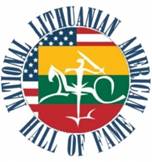
Bringing attention to Lithuania’s epic history and the global contributions of its people today in the arts, sciences, sports, politics, and economics.
Football greats Dick Butkus and Johnny Unitas, film director Robert Zemeckis, screen stars Charles Bronson, Ann Jillian, and Ruta Lee, musicians Benny Goodman and Bob Dylan, author J.D. Salinger, and Senator Dick Durbin are but a few famous individuals with roots in a nation that was once the largest and amongst the most powerful in Europe, Lithuania. Their achievements will now be commemorated by The National Lithuanian-American Hall of Fame (NLAHF).
Mon, 17th October, 2011 - Posted by - (3) Comment
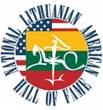
Was Columbus
a Lithuanian prince?
|
SON? |
FATHER? |
Historian unmasks Columbus’ true identity.
Will Lithuanians be able to add another page to their already epic history? Will the National Lithuanian American Hall of Fame (NLAHF) have yet one more candidate for induction? Daine Jablonskyte-Marquez and Jon Platakis, members of the NLAHF, tracked down historian Manuel Rosa at his job at Duke University, to enlighten us on his 20 plus years of research into the identity of Christopher Columbus.
Confidently, and with primary source documents to verify his assertions, Rosa states, “Columbus was a royal prince, son of a Portuguese noble lady and exiled King Wladyslaw III (a direct descendent of one of Europe’s greatest ruling dynasties, Lithuania’s Gedeminian dynasty). He was hiding his identity from the public at large but the courts of Europe knew who he was.” Pointing to documentation in his new book, COLON. La Historia Nunca Contada (COLUMBUS. The Untold Story) recently published in Spain, and to be published May 2012 in Poland, that Columbus’ marriage in 1479 to a Portuguese noblewoman, who was a member of the Portuguese military order of Santiago, required the approval of the King of Portugal, a procedure reserved only for someone of major importance. “This new Portuguese document alone,” stated Rosa, “makes the entirety of Columbus’ Italian history false.” Rosa’s evidence appears irrefutable that Columbus, who had been housed in the palaces of the nobility, had access to royal courts, and married into nobility, could not be, as our history books tell us, the son of a poor weaver from Genoa.
So, who was Christopher Columbus, if not a poor weaver’s son from Genoa? Rosa believes that his true identity was Prince Segismundo Henriques which was concealed in order to protect his father. All of Rosa’s evidence points to Wladyslaw III, king of Poland and Lithuania as being the father of Christopher Columbus. Rosa suggests that there is proof the king survived the Battle of Varna in 1444 against the Ottomans and lived in exile on the island of Madeira under the name of “Henrique the German,” married to a Portuguese noblewoman.
Mon, 19th September, 2011 - Posted by - (5) Comment

Members of 'The Lithuanian-American Community
protest outside the Capitol in Washington in 1990, against
Soviet President Gorbachev's policy regarding the
Baltic States. They played a real role by then.
Is there still a role for them to play?
Photo: UPI, Joe Mahoney.
Lithuanian Americans have always found themselves as defenders of the ideas and ideals of both Lithuania and their adopted country, the United States. During the years of Soviet occupation, Lithuanian Americans played a key role in keeping hope alive. Without the actions of Lithuanian Americans, there would not have been a non-recognition policy, and without the hard work of so many Lithuanian Americans past and present that policy would not have served as the beacon of hope it was for Lithuanians in Lithuania.
Not surprisingly, many Lithuanian Americans concluded at the time of the end of Soviet occupation that their job was completed. After all, what they had done for more than 50 years was little short of heroic. And there was the additional and for some extremely painful fact that many in Lithuania itself felt that the diaspora had made its contribution but that Lithuanian-Lithuanians must now take the lead in the future development of their country.
As a result, many Lithuanian Americans have ended or at least reduced their participation in public life. Now, this withdrawal from public life threatens to become a stampede. Lithuania has become a member of NATO, a step that many have seen as the final guarantee of its independence and security. And Lithuania has joined the European Union, another step toward the reintegration of Lithuania into the European world from which it was so brutally wrenched by the Soviet government in 1940.
But these events should not be the “end of history”, there are many serious challenges ahead both for Lithuania and for Lithuanian Americans, all of us who care about Lithuania may have to work harder than we ever did in the past.
The Soviet occupation of the Baltic countries continues to cast a shadow on the political calculations in Moscow and in the minds of many Lithuanians, and because this is so, Lithuanian Americans have a special role to play in dispelling both these shadows.
I don’t think it is an exaggeration to say that had there not been a Lithuanian diaspora, the Soviet government might have survived far longer than it did. Now, it is imperative that Lithuanian Americans again play the key role in making sure that Lithuania will not suffer because of such actions. And that includes not only telling the West but making sure that people in Lithuania understand what is at stake as well.
Lithuanian Americans have played a key role in fighting the hangover of the communist past, and we can all be proud of the role that Lithuanian Americans have played. I believe that Lithuanian Americans can make a significant contribution also to the future. But we need to recognize that the threats to that future are real and that Lithuanian Americans need to act as they have in the past.
Egle Dudenas
Egle Dudenas wrote this article in 2005, but her points are as good today as they were by then. VilNews is hereby inviting our readers to comment on this important topic.
Click here if you wish to read this article on white background
Fri, 5th August, 2011 - Posted by - (3) Comment
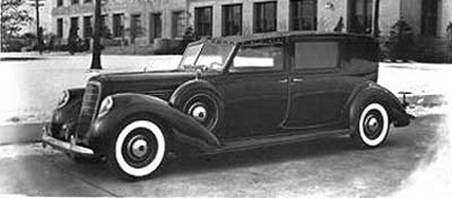
Straight-line 12-cylinder 1938 Lincoln Saloon
By KR Slade
Sunday was, as usual, the day for Father and me to go to Lithuanian Catholic mass; and, as usual, thereafter, to return to my familiar English-speaking world. Our Sunday masses were always at our Lithuanian church -- the only one between Massachusetts and Connecticut. I never had any idea what anyone at church was saying, because I did not understand any Lithuanian. In 1958, the mass was in Latin; however, the sermon, readings, singing, and announcements were in Lithuanian. I understood some Latin, although I was only ten years old. It was the ‘everything else’ -- before, during, and after church -- that I did not understand . . .
After mass, there was our weekly tradition: a couple of ‘dogs’ at the ‘New York System’ wiener-joint, just around the corner from the church, in the old inner-city Lithuanian neighbourhood; then a drive across town to the Italian bakery for a box of pastries to take to Mother’s parents’ house for an hour or two of ‘Sunday visit’.
Wed, 3rd August, 2011 - Posted by - (5) Comment

I think many will be astonished learning about the huge variety of distinctive Lithuanian footprints existing in the soils of almost every corner of our world.
Some of the footprints are centuries old and sometimes hard to spot after having been exposed to wind, weather and sometimes conscious or unconscious oblivion. Others are clear, visible and significant also today.
Common to all the prints is that they help to tell the story of a fascinating nation and a people that during the past millennium has been through so unbelievably much. Though the Lithuanian people are really not just one people but a facetted range of peoples from many very different nations and cultures.
Lithuania is a nation where only about 50% of the population lives in the very country, while the other half is scattered throughout all corners of the earth. But those who live outside the country are of course as much Lithuanians as the present residents, and it is perhaps time to combine the international and local Lithuania into a unique, powerful unification? Maybe is it now the right moment to start significant bridge-building, reconciliation and renewed cooperation?
We hope VilNews can be of some help in identifying and describing some of the nation's worldwide footprints, and also in bridging some of the gaps between the motherland and its diasporas..
Below a few examples of significant Lithuanian footprints in different parts of the world. Please write us and share your story with our readers!
BARI, SOUTHERN ITALY
|
|
|
Bona Sforza (1494-1557), Grand Duchess of Lithuania, Queen of Poland, Duchess of Bari and Princess of Rossano, left the Royal Palace in Vilnius after her husband Grand Duke Sigismund the Old died in 1548. She stayed eight years in Poland and then went to Bari in Southern Italy to claim a sizeable dept from King Philip II of Spain. But instead she was poisoned by her trusted officer, Gian Lorenzo Pappacoda, acting on behalf of King Philip. She was buried in St. Nicholas' Basilica in Bari, where her daughter Anna had a beautiful tomb made in the current Renaissance style for her remains (above, left).
See also: https://vilnews.com/?p=1652
CAPE TOWN, SOUTH AFRICA
|
|
|
Dr. Mendel Kaplan (1936-2009), steel magnate, writer and philanthropist, whose family emigrated from the town Rietavas (near Klaipeda) in the 1920s was called "the father of the South African Jewish community," also very much involved in the establishment of the South African Jewish Museum in Cape Town, a museum that appears more Lithuanian than Lithuania itself. Walking through the museum's cellar floor is like walking through Rietavas in year 1900.
Read more at: https://vilnews.com/?p=1703
DELHI, INDIA
|
|
|
Professor Lokesh Chandra (84), one of India's leading experts on Sanskrit and Buddhism, tells me this early morning in his New Delhi office: "The very mention of Lithuanian opens up an image, a vision that gives a people their identity through language. It shows how the darkness of dreams becomes the new embodied hope. My father was stimulated and strengthened in his work on the development of Hindi by the history of Lithuanian language. It has been the eternal continuity of these people; - it rustles something deep in their being. My father felt that we in India share with our distant Lithuanian brothers the silent geography of lost frontiers. Political freedom is inseparable from language."
And the professor continues his amazing story: "My father would relate how grandmas in the remote villages narrated folk-tales to eager grandchildren in their Lithuanian language which was despised by the Slavised nobility and punished by the Czarist regime. My father also told me how the Lithuanian daina (songs) were abandoned by the courts, but still continued to live on in the villages, faithfully preserved by the poorest people of Lithuania, guarded by the mothers of the families even during the darkest periods of Lithuania's history."
"Such was my first contact with Lithuania, in 1937, at an age of ten," smiles Professor Chandra this early Delhi morning.
Read more at: https://vilnews.com/?cat=18&paged=2
BOGOTÁ, COLOMBIA
|
|
|
Antanas Mockus (his full name is Aurelijus Rutenis Antanas Mockus Šivickas) was born 25 March 1952 in Bogotá, Colombia. His parents were Lithuanian immigrants. He is a mathematician, philosopher, and politician. He was mayor of Colombia's capital, Bogotá (population more than 7 millions), for two terms, during which he became known for springing surprising and humorous initiatives upon the city's inhabitants. These tended to involve grand gestures, including local artists or personal appearances by the mayor himself — taking a shower in a commercial about conserving water, or walking the streets dressed in spandex and a cape as Supercitizen. The impact of Mockus on the development of Bogotá is described in a documentary film released in October 2009 with the title CITIES ON SPEED - Bogotá Change.
ARCTIC & SPACE
|
|
|
Mikalojus Konstantinas Čiurlionis (1875-1911), Lithuania's national painter and composer, has a mountain and an asteroid named after himself. In 1913 on an expedition through the Arctic ocean a painter N.Pinegin turned his attention to a plateau in the Franz Josef Land archipelago, which resembled M.K.Ciurlionis' painting "Stillness" (above). So he called it the Ciurlionis Mountain. In1975 the Crimean astrophysicist Nikolaj Cernych discovered a new 8 km diameter asteroid and called it the Ciurlionis asteroid. It orbits round the Sun in approximately four years (average distance from the Sun: 384 mln. km).
Fri, 29th July, 2011 - Posted by - (4) Comment

A new campaign is born! The campaign is called ‘Invite Your Friend to Lithuania’, already receiving good support from service businesses all over the country and abroad. Those who invite friends to Lithuania can even win free flights to Vilnius, Kaunas or Palanga, visit various events free of charge, get souvenirs and receive discounts different places.
People are invited to join the initiative at www.invite2lithuania.com or at the initiative’s Facebook Page where we all are encouraged to invite our friends and acquaintances to Lithuania.
The campaign seeks to invite a record number of people to visit Lithuania in 2011-2012 through Lithuanians and friends of Lithuania all around the world. The Campaign is organized by ‘Global Lithuanian Leaders’ (GLL) - a network that unites talented professionals and leaders who associate themselves with Lithuania and contribute to the continued economic, political, social and cultural transformations currently underway in Lithuania.
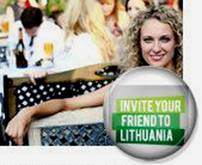
Dalia Venslovaitė
Dalia Venslovaitė, Director at GLL tells that ‘This year Lithuania has already welcomed a record number of visitors. Our goal is that people who have already visited and enjoyed Lithuania would invite others through their social networks. Moreover, we focus much on Lithuanians living abroad. They are our best ambassadors in revealing why it is worthwhile visiting Lithuania‘.
According to the Lithuanian State Department of Tourism under the Ministry of Economy, during the first quarter of 2011 there was a 39.4 % increase in tourism in Lithuania comparing to the previous year. During the latest quarter Lithuania has welcomed 150 000 tourists while the total number of tourists last year was 107 000. One tourist spends around 1.040 LTL daily. Last year an average stay of one tourist in Lithuania was 4.3 nights. Hence, one tourist alone brings around 600 LTL directly into the state budget.…
Fri, 29th July, 2011 - Posted by - (0) Comment

PHOTO: http://www.migracija.lt
On 1 January 20111, the population of the EU27 was estimated at 502.5 million, compared with 501.1 million on 1 January 2010. The population of the EU27 grew by 1.4 million in 2010, an annual rate of +2.7 per 1000 inhabitants, due to a natural increase of 0.5 million (+1.0‰) and net migration of 0.9 million (+1.7‰).
These figures come from a report published by Eurostat, the statistical office of the European Union.
In 2010, over 60% of the increase in the EU27 population came from migration. In relative terms, Luxembourg (+15.1‰), Malta (+5.4‰), Sweden (+5.3‰).
Italy (+5.2‰) and Belgium (+5.1‰) had the largest net inflows.
Lithuania (-23.7‰) and Ireland (-7.5‰) recorded the highest net outflows.
Crude rates of population change (per 1000 population)
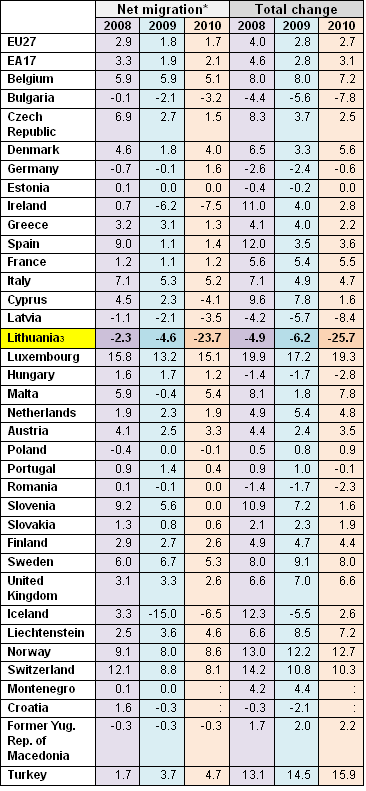
* Including the statistical adjustment that corresponds to all changes in the population that cannot be classified as births, deaths, immigration or emigration.
3. Due to administrative reasons, the relatively high net migration in Lithuania in 2010 may include emigration that took place over previous years.
Eurostat news releases on the Internet: http://ec.europa.eu/eurostat…
Tue, 5th July, 2011 - Posted by - (0) Comment
WORLD LITHUANIAN ECONOMIC FORUM
VILNIUS, 4-5 JULY:

The World Lithuanian Economic Forum (WLEF) is still in full swing as I write this. So I should be careful about drawing too many conclusions yet. What I have seen so far, is an event where some 400 people meet to discuss what more can be done to collect Lithuanians from all over the world to joint efforts for their fatherland. More investments, more engagement is being requested. The mood is good, the speeches and discussions as well. Yet I can not help but wonder why only about 100 of the 400 attendees are foreign-Lithuanians. Nearly half of all who call themselves Lithuanians live, after all, far from their country of origin, and they should constitute a very significant resource for further development of this nation.
It was also remarkably few business people represented, as a percentage of the number of participants, hence the business-to-business impact can hardly have been very large.
Yet it is my conviction that this is an event that has a future, and I hope to see WLEF in Vilnius also next summer.
These are mythree suggestionson how tofurtherdevelop and enhance the event:
1. MORE BUSINESS-TO-BUSINESS
The president, government, organizations and businesses should work together to make WLEF even more business-oriented, to invite and prepare for specific interaction activities between local and international companies. Local organizations and their sister organizations in other countries, like Rotary Clubs, should be integral parts of the event, planning well in advance for face-to-face meetings at the event.
2. A PERMANENT, YEAR-ROUND OPERATION
ICC, together with other organizations, should establish a permanent secretariat, with state support, for a year-round operation of the kind of activities that should appear in each year's WLEF summer event.
3. AN EVEN BROADER FORUM – FIRST WEEK OF JULY EVERY YEAR
The WLEF forum should become an annual tradition, going on for a whole week every summer, for example during the first week of July in connection with the celebration of King Mindaugas coronation on 6 July. The event should include several types of activities; within business, culture, festive gatherings, etc. I think this would make more foreign-Lithuanians and their families come to participate. The weaving of contacts would also be improved by more social interaction, and the many who live outside the home land will increasingly feel that they are appreciated and welcomed home!
Aage Myhre, Editor-in-Chief
|
THE OPENING SPEAKERS |
|
|
|
|
|
THE KEY-NOTE SPEAKERS |
|
|
|
|
|
THE ROUND TABLE PANEL DEBATERS |
||
|
|
|
|
|
|
|
|
The round-table debaters had some good points in yesterday's WLEF meeting. The question they all would answer, was what they thought should be done to make Lithuania more progressive and competitive in the future.
EDUCATION, EDUCATION, EDUCATION
"Education, education, education" was David Passig's formula, with reference to statistics showing that there is a clear correlation between education level and economic growth in a country.
Education Minister Steponavicius noted dryly that there still are too many students who are more concerned with getting a diploma than to acquire acquire real knowledge, concluding that the quality level of higher education in Lithuania must be raised. "20 years have given us the time we need to find our place in the context of 'global Lithuania. Now it is high time that we have developed an education reform that works," the Minister stated.
MINISTRY OF TALENT – BRAIN CIRCULATION
Omnitel's President Antanas Zabulis, suggested that the Ministry of Education should perhaps change its name to 'Ministry of Talent' and also mentioned that Lithuania no longer should focus neither on brain drain nor on
brain gain, but on brain circulation.
By virtue of his position he also noted that broadband and other internet Internet solutions are highly essential for a good development of Lithuania. "It is no longer enough to have good ideas, speed is now just as important," he said.
ISM's President, Nerijus Pačėsa, meant that more private universities (as ISM is) would raise the education standard in this country, referring to the fact that the highest graded universities in the U.S. and Japan all are private.
"Also, Lithuania should adopt financing of education through loans, as in Western countries, not leave it all state-financed as is today's situation," he added.
IMPROVED COLLABORATION GOVERNMENT – BUSINESS
Economy Minister Žylius expressed eagerness to improve opportunities for collaboration between government and business. He also said that the
financial tools one now has access to through EU funds, etc. should be applied to the development of mechanisms that promote future developments within the fields of technology, industry, FDIs, etc.
"The government should not tell business what the future will look like, but be a predictable, good facilitator for the business community to see and discover future opportunities," said the Minister.
LET'S BUILD THE BALTIC STATES' LARGEST CONFERENCE CENTRE
Air Baltic's chief in Lithuania, Tadas Vizgirda, referred to some rather gloomy
statistics about tourist traffic into Lithuania. The sad fact is that Latvia has around 5 million visitors per year, while Lithuania, a country with 50% more
inhabitants, is visited by just 1.5 million annually." An enormous potential
that our tourist authorities should no longer ignore, especially considering that every tourist will leave around LTL 600 in tax money," he said, adding that Lithuania would be able to obtain a solid position for professional
travelers if there was invested in building the Baltic States' largest conference centre right here over the next few years.
THE EVENING MUSIC
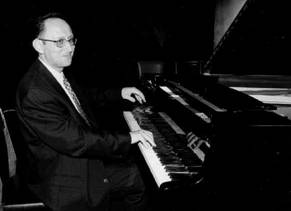
Zecharia Plavin,
a famous Israeli pianist, born in Lithuania, entertained the WLEF delegates
with superb interpetations of Ciurlionis, Liszt and Ravel.
|
THE ORGANISERS |
||
|
|
|
|
ICC Lietuva is organizing the World
Lithuanian Economic Forum (WLEF)
The goal of the World Lithuanian Economic Forum is to draw Lithuanian business people, economists, politicians and scientists from the entire world into Lithuania's economic life, to strengthen their relations with Lithuania, to encourage them to develop business here, to help attract investments to Lithuanian companies and to create a global network of Lithuanians from all the world.
The Forum is organized by the Lithuanian Business Confederation | ICC Lithuania in cooperation with governmental institutions as well as business companies.
The organizers are doing a great job that they deserve very much honour for!…
Thu, 30th June, 2011 - Posted by - (13) Comment
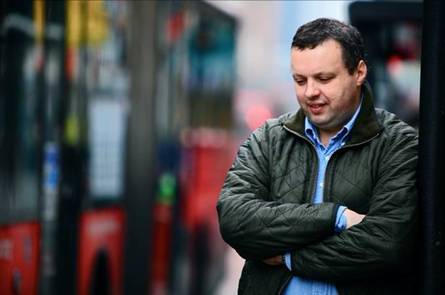
My name is Andrius Užkalnis, I am 40 and later this month I am coming back to Lithuania after a long time in England.
Photo: Otto Kylmala.
By best-selling writer Andrius Užkalnis
In three weeks' time, I will become a resident of Vilnius – again, after almost 17 years.
I was asked to write this for VilNews – where not many people know me. My name is Andrius Užkalnis, I am 40 and later this month I am coming back to Lithuania after a long time in England.
I moved to UK as a very young man, back in 1995, to work for the BBC, where I spent over 16 years – initially as a linguist and then as a manager, working in various parts of the world.
Sun, 26th June, 2011 - Posted by - (1) Comment
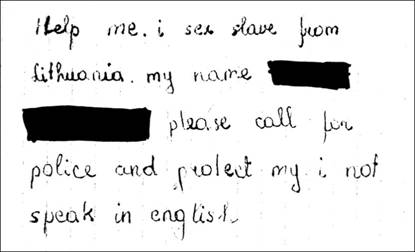
“Help me. I am a sex slave from Lithuania. Please call the police and protect me,” says a note which the Danish newspaper Ekstra Bladet got access to this week. It was a terrible view meeting the Danish police when they found the 19-year old Lithuanian girl in a lapidated Copenhagen apartment this week. The woman stayed in very miserable conditions.
“The kitchen was, in my opinion not suitable for people and there were cockroaches everywhere. Moreover, we found evidence that someone had managed to fit a padlock on the outside of the door into the woman's room,” says Trine Møller Andersen, head of the Copenhagen Police group against women trafficking.
The young Lithuanian woman lived in an inhuman nightmare in which she had been kept as a sex slave.
When she was not serving sex clients, who apparently could not feel the soggy conditions in the 'sex-nest', she lived in a spartan, unhygienic room with only a mattress on the floor and old, dirty bed linens full of cockroaches.
Outside the room the door was mounted a bracket made ready so it could put a padlock on - if the sex slave should get ideas about escaping.
But the woman had still succeeded in sending a cry for help to a friend in Lithuania over the Internet and asked her to contact the Lithuanian police to tell that she was incarcerated against her will.
And after the Copenhagen police on Monday received an official request from the Lithuanian police via Europol, they soon found the woman's 'prison'.
Help me
And it was a depressing sight that met them in the apartment where the woman lived and served men that her pimp brought to her.
The 19-year-old woman began to cry, but when she found out that it was the police, she gave a handwritten note to the female police officer who found her, which in English told that she was kept as a sex slave, that she wanted to contact the police and that she did not speak English. The woman's pimp, a Lithuanian 36-year old man, was also found on the site.
He was arrested and charged with violation of Penal Code provisions on trafficking. He was remanded in custody for four weeks in Copenhagen.
Miserable conditions
“The woman was in physically fine form. She had not been beaten. But she was shocked and scared and very influenced by the situation,” says Trine Møller Andersen, leader of the group against woman trafficking at the Copenhagen Police. She had never seen a similar case, since she started in the group in 2008.
The much older perpetrator had recruited the woman in Lithuania. Here he had got her drunk and had persuaded her to go to Denmark and work as a prostitute with the promise of good earnings as a pawn.
The man then transported her to Denmark and placed her in an apartment in a Copenhagen district, where she also served customers. The perpetrator found the customers, and the woman got only a very small payment. The woman had lived in Denmark for little over a week when the police found her.
The young woman from Lithuania is now at a women’s shelter. She will later return home to Lithuania in accordance with her own wish.
“It's the classic story of these women who do not have the longest school education and who are in desperate need of money, so they can be lured here,” tells Trine Møller Andersen to Ekstrabladet.
Sat, 18th June, 2011 - Posted by - (5) Comment
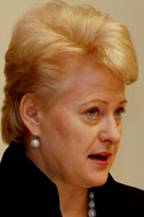 Dalia Grybauskaite, President of the Republic of Lithuania |
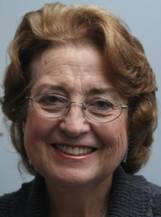 Regina Narusiene, President of the World Lithuanian Community |
REGINA NARUSIENE: "The majority, I believe, are disappointed and discouraged with the present president's seemingly unfriendly view toward Lithuanian-Americans and others abroad."
The Baltic Times writes that Lithuanian President Grybauskaite is supposedly "disappointed by Lithuanian emigres' inability to attract U.S.-based investments to Lithuania." The newspaper refers to a WikiLeaks document.
According to WikiLeaks, Grybauskaite emphasizes that most prominent U.S. Lithuanian emigres, instead of focusing on developing U.S.- Lithuanian business ties, prefer providing political advice to the Lithuanian authorities, which may not be that necessary nowadays.
In a response to The Baltic Times, Regina Narusiene, President of the World Lithuanian Community, says that "The majority of Lithuanian-Americans are disappointed with Grybauskaite."
"How do Lithuanian-Americans' views generally differ on the former U.S.-much-linked President Valdas Adamkus and his successor, Dalia Grybauskaite? Which is favored?," the newspaper asks Narusiene.
And she answers: "There are different points of view. Some favor President Adamkus, but the majority, I believe, are disappointed and discouraged with the present president's seemingly unfriendly view toward Lithuanian Americans and others abroad."
"There is the tendency of some Lithuanian politicians to think that "Lithuania belongs to the Lithuanians." By that they mean those living in Lithuania only. The people of Lithuania have a more favorable view of Lithuanians living abroad."
"The Lithuanians abroad have brought many investments to Lithuania. However, I want to emphasize, Lithuania has been having a difficult time setting an investment climate competitive with other countries."
"Collaboration can have different meanings. Our private ties with the country after independence never diminished, but, in fact, intensified. Economic ties are different. A great deal of money is sent to Lithuania by Lithuanians abroad, especially to their family and friends. I believe an amount equal to about 20 percent of Lithuania's annual national budget. Some firms have located in Lithuania, but Lithuania has to maintain an inviting environment for investment, which they are developing. Cultural collaboration, however, I admit, has been weak. There is a Lithuanian opera in Chicago that has been collaborating with the Lithuanian National Opera and Ballet Theater. We have participated in the Dance Festivals in Lithuania and sent works of art to Lithuania. Some of the entertainers from Lithuania have come to us to entertain, but working out joint programs has been difficult."
"Can you think of any cases when Lithuanian emigres cut off their ties with the Motherland because of the lack of the political will to adopt a dual-citizenship law?," Baltic Times asks.
"There are a number of new emigres who have simply said, "I can do better and live more securely abroad. If they do not want us, then why bother." Unfortunately, these are well educated young people that Lithuania cannot afford to lose. In several instances, the taking away of Lithuanian citizenship has forced some to keep foreign citizenship so as not to lose their means of support, their pension."
Ref: http://www.baltictimes.com/news/articles/28875/
* * *
Around half of all Lithuanians in the world live outside their home country. They represent a human resource Lithuania desperately needs to get the country back on its feet again after 50 years of bloody wars, genocides, deportations, Soviet opression and now two decades with much muddle and confusion instead of professional focus on collaboration and team work among its own populations here and abroad.
I suggest that the president now reaches out and invites all Lithuanians, and friends of this country around the world, to a close and constructive cooperation. A continued conflict is truly meaningless and devastating.
Aage Myhre, Editor-in-Chief
Lithuania would benefit significantly by availing itself of the expertise and knowledge found in the Diaspora communities
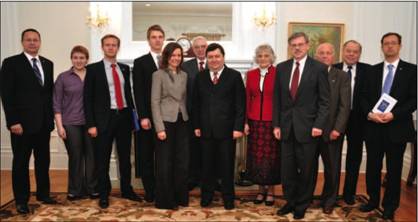
Lithuanian American Council (LAC) Delegation in Conference at Lithuania's Embassy (LE) in Washington, D.C. with Ambassador Žygimantas Pavilionis, and Emanuelis Zingeris from the Lithuanian Parliament
A delegation representing the Lithuanian American Council (LAC) was recently received at the Lithuanian Embassy in Washington D.C., where it met with the Chairman of the Foreign Affairs Committee of the Lithuania's Parliament, Emanuelis Zingeris and Lithuania's Ambassador to the United States, Zygimantas Pavilionis.
In the course of the meeting LAC representatives expressed their concern on a wide range of topics including Lithuania's developing energy policy, the country's image in the international community, emigration issues and their demographic impact, the prospect of maintaining citizenship rights of recent immigrants, ongoing cooperation between organizations of the Diaspora and Lithuania, and minority issues in Lithuania. LAC representatives suggested that Lithuania would benefit significantly by availing itself of the expertise and knowledge found in the Diaspora communities in developing energy and security policies and a host of other areas such as environmental issues, ecology, medicine, economic development, and the promotion of improved interactions between the government and the people through non-governmental organizations.
Sat, 18th June, 2011 - Posted by - (0) Comment
The World Lithuanian Economic Forum, 4 – 5 July:

Mindaugas Glodas, General Manager of Microsoft Lithuania:
“The World Lithuanian Economic Forum is a perfect meeting platform for Lithuanian business people from all over the world and for those who are interested in Lithuania as a potential partner. I believe that making personal contacts is the best means to foster international cooperation and successful growth of new businesses. Lithuanian business needs new markets and investment for development of new ideas. This is one more step that has to be taken towards seeking to make Lithuania more important for the world and to making the world more important to Lithuania.”
PROGRAMME: http://www.plef.lt/programa.htm…
Mon, 30th May, 2011 - Posted by - (1) Comment

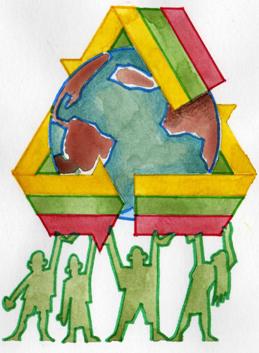
There is over a million of people of Lithuanian origin living outside Lithuania. Having left their motherland in different times and of different reasons they are now living and working in countries around the world. Many of them became successful businessmen: owners or managers of big corporations and companies or highly ranked experts in different fields.
Establishing of a closer relationship with Lithuanians living abroad should nowadays be one of the most important goals in the strategy of our government. The diasporas represent an invaluable source which can enrich Lithuania and help to create a better future of our country.
The goal of the World Lithuanian Economic Forum is to attract Lithuanian business people, economists, politicians and scientists from the entire world into Lithuania’s economic life of today, to strengthen their relations with Lithuania, to encourage them to develop business in our country, to help attract investments, to enterprising growing Lithuanian companies, to create a global network of Lithuanians from all over the world.
The Forum is organized by Lithuanian Business Confederation | ICC Lithuania in cooperation with a number of partners – governmental institutions as well as business companies.
The first Forum, named “Competitive Lithuania: innovative economy, effective business development and investment”, was organized in 2009 in Vilnius. In 2010 WLEF “High tech innovation & investment: local to global” was held in London. Both events got loads of attention from public and media. Following the traditions this year WLEF comes back to Vilnius and will be held 4 – 5 July.
The main theme of his year’s event is the creation of a competitive state. Experts, business people and scientists of different spheres from all over the world will discuss the vision of the world and Lithuania in ten years, the creation of competitiveness through innovations, a partnership between business and science, the encouragement of starting and growing businesses.
For registration and additional information: http://www.plef.lt/
Fri, 13th May, 2011 - Posted by - (6) Comment
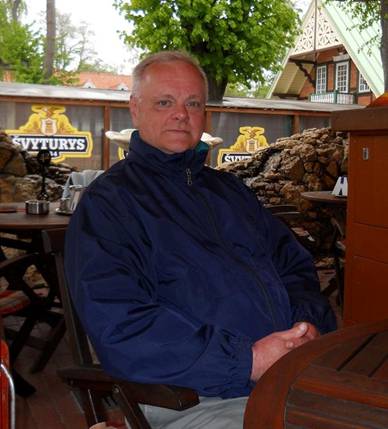
Please contact our Associate Editor, Vin Karnila, as soon as
possible if you think a ‘Genealogy Section’ in VilNews would
be of interest for our readers around the world.
vin.karnila@VilNews.com
Text: Vin Karnila, Associate Editor
We at VilNews have received numerous inquiries from our readers regarding locating relatives in Lithuania or more specific information about their Lithuanian ancestors. Since we know that tracing your Lithuanian Roots is a very important issue for many of you, we are considering a special section, “Genealogy Lithuania”, to assist you in finding information about your ancestors in Lithuania.
Please respond to us if you think such a section would be of interest for our readers around the globe.
VilNews e-magazine is published in Vilnius, Lithuania. Editor-in-Chief: Mr. Aage Myhre. Inquires to the editors: editor@VilNews.com.
Code of Ethics: See Section 2 – about VilNews. VilNews is not responsible for content on external links/web pages.
HOW TO ADVERTISE IN VILNEWS.
All content is copyrighted © 2011. UAB ‘VilNews’.